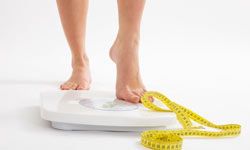“
 “Some diet myths could foil your weight loss plans. See some diet fad pictures.©iStockphoto.com/Stockphoto4u
“Some diet myths could foil your weight loss plans. See some diet fad pictures.©iStockphoto.com/Stockphoto4u
From Halloween on through the holidays, opportunities to gorge on rich and fattening foods are plentiful. Food-centric celebrations fill out people’s calendars and waistlines, thanks to decadent candies, desserts and rich casseroles. After months of gluttonous behavior, the new year inevitably arrives, at which time many people expect to snap their fingers and undo all of the dietary damage they’ve done in recent months and then some.
Although many people hop aboard a drastic calorie-cutting bandwagon at the start of each year and devote themselves to fad diets, experts often encourage healthier get-in-shape plans. However, because of the sheer amount of seemingly helpful weight-loss information available, figuring out what’s actually healthy can be harder than it seems. In this article, you’ll learn about five widespread weight-loss myths that can lead to diet pitfalls — and some tips on how you can avoid them. Read on to find out which foods aren’t as bad for you as you may have been led to believe.
Contents
- Carbs Are Evil
- Snacks and Desserts Will Ruin a Diet
- Avoid Fats Like the Plague
- Never Eat in the Evening
- Don't Step on a Scale
5: Carbs Are Evil
 “
“ “Eating carbs — including pasta — won’t kill you, and actually may be a healthy addition to your diet.©iStockphoto.com/ bravobravo
“Eating carbs — including pasta — won’t kill you, and actually may be a healthy addition to your diet.©iStockphoto.com/ bravobravo
The advent of popular high-protein, low-carbohydrate diets quickly turned carb-rich foods into culinary pariahs. But more and more studies now show that shunning carbohydrates can be detrimental in several ways.
Many low-carb diets recommend nixing bread, pasta and other delicacies in favor of meat, eggs, cheese and other foods that are high in protein. Although protein is a necessary component of any healthy diet, this extra fat and cholesterol can quickly turn into a person into a ticking heart-disease time bomb. Carbohydrates also prevent kidney stones and a metabolic condition called ketosis when consumed in levels higher than 130 grams per day. Eating less than that causes ketones, which are fats that have only been partly broken down, to build up in the blood, leaving a person primed and ready for these largely preventable and painful problems [source: Weight-control Information Network]. Cutting out high-carb fruits and vegetables also sets the stage for constipation because they contain necessary dietary fiber.
Many nutrition experts now urge dieters to adopt healthy diet and exercise habits, rather than going the crash-diet route. Carbohydrates in moderation, particularly brown rice and whole-wheat pasta, provide many nutritional benefits, keep you feeling full longer and are more easily digested than highly processed carbs [source: NHS]. Do resist the urge to consume an entire plate of pasta and all of the extra calories that you don’t really need. Instead, try eating around two or three ounces of the whole wheat variety and serve it alongside veggies and other essential foods.
4: Snacks and Desserts Will Ruin a Diet
 “
“ “Eating desserts in moderation shouldn’t undermine your diet.©iStockphoto.com/AngiePhotos
“Eating desserts in moderation shouldn’t undermine your diet.©iStockphoto.com/AngiePhotos
Usually it’s not the snacks or occasional dessert that does a diet in, so much as it is the type and quantity of said treat. If your idea of a snack is an entire bag of chips, it would probably be best to ditch the high-fat, high-calorie indulgence in favor of something healthier and equally filling, like fruit or even a bowl of cereal.
The occasional snack is necessary to avoid dips in blood sugar, keep energy levels high and avoid binging at main meals. More often than not, dedicated dieters who constantly deprive themselves of their trademark treat, be it peanut butter or chocolate, will end up binging later on, undoing their progress. Instead, nutritionists recommend rewarding yourself once in awhile to avoid this major dieting pitfall. As long as most food choices are healthy ones and daily caloric intake is the same, healthy snacks or the occasional dessert should have little or no impact on diet success [source: MSNBC].
3: Avoid Fats Like the Plague
Despite their promising labels, low-fat foods can be deceiving in more ways than one. Often, people who choose low-fat foods over their full-fat counterparts eat way more than they should because they believe them to be so much healthier. As such, weight loss can be thwarted by uninformed consumption of these foods. Just because a product is low in fat does not mean it is low in calories. Nutritionists encourage dieters to do a little legwork and compare low-fat and full-fat products as far as calorie and fat content goes. Also, "reduced-fat" foods can carry that label without having to meet legal criteria the way that low-fat foods do, so take that into consideration when choosing products [sources: NHS, Weight-control Information Network].
Also, if the word "fat" is enough to send you screaming for the hills, you may want to reprogram your understanding of the word. Not all fats are unhealthy, and some are actually a vital part of everyone’s daily diet. Polyunsaturated fats and monounsaturated fats, such as those found in nuts, fish and certain oils (olive, canola and safflower) are believed to lower your chance of cardiovascular disease. It’s still a good idea to minimize consumption of heart-unhealthy trans fats found in packaged and fried foods and saturated fats, which are found in dairy products and beef.
Calories are the Culprit
It can’t be stressed enough — experts insist eating foods with too many calories are the main cause for weight gain. Cutting them too drastically is not healthy, so simply figure out your average daily calorie consumption and cut them by about 500 per day to lose a pound a week. Women should have between 1,400 and 1,600 a day to stay healthy and men need 1,600 to 1,800 [source: MSNBC].
2: Never Eat in the Evening
 “
“ “Make smart choices when you’re rummaging for that late-night snack.©iStockphoto.com/ WebSubstance
“Make smart choices when you’re rummaging for that late-night snack.©iStockphoto.com/ WebSubstance
This long-held myth claims that any post-dinner indulgences are converted immediately into fat. Experts are now downplaying this rule because calorie consumption, rather than time of day, is once again the key determinant of diet success. The main point is that a pre-bedtime snack or dessert isn’t detrimental to your diet, so long as it’s not eaten on the heels of a high calorie day. Overall, the main culprit of diet failure is excessive calorie consumption over each 24-hour period [source: MSNBC]. So, if you’ve had a reasonable day nutritionally, an evening treat won’t completely derail your progress. That said, it’s wise not to go completely overboard right before you hit the sack because the human body simply doesn’t burn as many calories while sleeping as it does when awake. So, before you indulge in an evening snack, consider how many calories you have consumed that day in relation to how much physical activity you’ve worked into the mix [source: Weight-control Information Network]. When in doubt, opt for a healthy, filling snack to coast your stomach through until morning.
1: Don't Step on a Scale
 “
“ “Stepping on the scale regularly can be a smart dieting move.©iStockphoto.com/webphotographeer
“Stepping on the scale regularly can be a smart dieting move.©iStockphoto.com/webphotographeer
For many people, the scale is the proverbial giant elephant in the room. Many people try ignoring it to avoid facing facts — those pesky extra pounds have once again snuck in and taken residence in unwelcome areas. Scale critics may be missing out, however. People who weigh in regularly (once a week is recommended) tend to notice when extra weight is slipping on. They are then able to nip it in the bud before two pounds turn into 20. Stick with the same scale every week and your results should be reliable. Savvy dieters and exercisers may also want to take measurements of the chest, arms, thighs, buttocks, waist and hips on a monthly basis. After all, muscle isn’t weightless, so you might be losing inches even if the scale shows that you aren’t dropping pounds [sources: Weight Watchers, MSNBC].
For more weight-loss myths and tips for a healthy diet, follow the links on the next page.
Lots More Information
Related HowStuffWorks Articles
- How Dieting Works
- How Calories Work
- How Fats Work
- How Low Sodium Diets Work
- How to Eat a Gluten-free Diet
Sources
- Albert, Sarah. "5 Weight Loss Myths." WebMD.com. (July 1, 2006). http://www.webmd.com/diet/features/5-weight-loss-myths
- Australia’s Healthy Weight Weekhttp://www.healthyweightweek.com.au/index.asp?pageID=2145857411
- Fields, Jennifer. "10 Diet Myths That Won’t Go Away." AOL Health.com. (2009). http://www.aolhealth.com/diet/basics/diet-myths
- Gordon, Sandra. "4 Diet Myths Debunked." Weight Watchers.com. (2009). http://www.weightwatchers.com/util/art/index_art.aspx?tabnum=1&art_id=651&sc=3010
- Harris, Lisa. "Measure Up." Weight Watchers.com (Jan/Feb 2004). http://www.weightwatchers.com/util/art/index_art.aspx?tabnum=1&art_id=19931&sc=3046
- Janzen, Jen. "Diet Myths." Ask Men.com. (2009). http://www.askmen.com/sports/foodcourt_200/209b_eating_well.html
- Keith, Kelley. "5 Things You Need to Know About Weight Loss Myths." (November 18, 2009). http://www.livestrong.com/article/3384-need-weight-loss-myths/
- MSNBC.com. "10 Weight-Loss Myths That Can Ruin Your Diet." (July 17, 2006). http://www.msnbc.msn.com/id/13897378
- NHS.uk. "Ten Weight-Loss Myths." (Sept. 21, 2009). http://www.nhs.uk/LiveWell/loseweight/Pages/Weightlossmyths.aspx
- Patz, Aviva and Marjorie Centofanni. "Weight Loss Myths Blasted." Psychology Today.com. (March 1, 2000). http://www.psychologytoday.com/articles/200003/weight-loss-myths-blasted
- Solo, Sally. "Busting 10 Diet Myths." Real Simple.com. (2009). http://www.realsimple.com/health/nutrition-diet/weight-loss/busting-10-diet-myths-10000001700385/
- Weight-Control Information Network. "Weight-loss and Nutrition Myths."http://win.niddk.nih.gov/publications/myths.htm
- Woodward, Susan. "10 Weight-Loss Myths: Don’t Be Fooled!" (2009). http://health.msn.com/weight-loss/articlepage.aspx?cp-documentid=100097046


